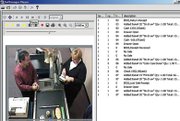New Point-of-Sale Systems Unveiled at NRF
Radio frequency identification (RFID) technology got plenty of attention during the National Retail Federation Conference, held Jan. 16–19 at the Jacob Javits Convention Center in New York. But retailers were also looking to gain insight into other emerging technologies, particularly on the point-of-sale (POS) front.
About 14,500 retailers and 400 exhibitors attended the 94th edition of the show. While RFID concerns were high among attendees, some companies also eyed merchandising software, security systems and POS enhancements.
As cashier stations move away from simple terminals and toward technology stations with a Microsoft Windows environment, suppliers are becoming more inventive with POS.
A survey released at the NRF Conference by McLean, Va.–based consulting company BearingPoint Inc. reported that 57 percent of retailers plan to upgrade or replace their POS systems this year. The offerings from vendors provided an impetus.
Irvine, Calif.–based POS provider Retail Pro, for example, has developed a POS security system called Remote Manager IP, which can track every keystroke at a terminal and can conduct digital video surveillance in a simple format that does not require the scanning of endless video feed.
The system generates messages from each terminal to one central monitor. As a result, managers can determine when someone checks in and out of a terminal and can gather receipt line data, cash records, item records (UPC codes) and credit card information.
One of the key drivers of the system is a search-and-playback menu that can track price changes, voids, returns, modified discounts, credits and other incidents with the click of a mouse.
The keystrokes made at a terminal are synchronized with video of the transaction, explained Scott Kreisberg, chief executive officer of One Step Data Inc., which is distributing the product for Retail Pro.
“Retailers can cue up all the questionable transactions for the day, all the discount sales for the day, all the exchange transactions for the day, when employees are checking in and checking out,” Kreisberg said. “Basically, Remote Manager IP provides a digital link between the video software that captures the images and the sales information already integrated with Retail Pro. Loss-prevention technology of this detail and sophistication has not been available to retail operations prior.”
New York–based Hand Held Products Inc. is among the first companies to address RFID at the POS level. The company showed its new TT8810 POS Transaction Terminal, which allows consumers to charge purchases by waving a credit card embedded with an RFID tag at the payment counter, thereby eliminating individual payment processing. The TT8810 connects the customer to customer relationship management software, which can link to retailers’ loyalty benefit programs, sales notifications and other programs. “There is no longer a need for the customer to sign or wait for a transaction to be completed,” said Nick Daddabbo, Hand Held Products’ senior product manager.
MasterCard and American Express have already tested RFID credit. Last week, Texas Instruments announced it will supply MasterCard with RFID chips by the middle of 2005, with implementation coming by the end of the year. MasterCard is using the chips for its PayPass international credit cards.
Hewlett-Packard is also making advancements on the POS front. The company announced that it plans to offer the Microsoft Windows Embedded for Point of Service platform on its popular HP rp5000 terminal, which has netted 150,000 units since its introduction 18 months ago. HP said the industry- standard software platform is the first to provide plug-andplay functionality, allowing retailers to add peripherals such as RFID hardware, scanners, printers and readers. The company expects to release the system during the second quarter.
Also new on the software front is the first retail Linux product, BlueCat, developed by San Jose, Calif.–based Lynux Works Inc., one of the leading providers of function-specific embedded systems. The company said BlueCat is an opensource (license-free) POS system and has the smallest memory footprint in the industry, meaning it has more available memory and a more stable working environment than other systems. BlueCat allows programmers to renew older legacy systems as well as enhance new systems. It is also scalable across a variety of platforms and retailer environments.
Retailing in general is expected to grow at a moderate pace in 2005, according to the NRF’s annual forecast. Apparel and general merchandise business should inch up 3.5 percent from last year. The report cited strong comparisons to last year’s growth, which had surged 10 percent.






















